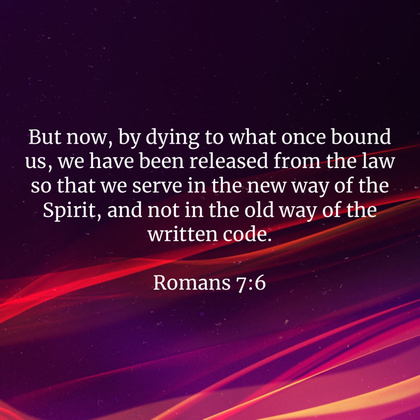|
Good morning!
We're so glad you decided to join us today! This is the first Sunday of Lent.
When we meet in person, we share our joys and concerns together. Think about the past week, and any prayer requests you may have. If you have any you would like to share, you can add them to this post as a comment. When you are ready, use the prayer below (source) to get started.
Thank You, Father, for including me as one of Your chosen servants. Enable me, in the power of the Holy Spirit and in the name of the Lord Jesus, to be a good and faithful witness to You in my earthly walk. May You be glorified and exulted in my life, and in all I say and do, I pray that I may sing forth Your eternal praises and glory, from this day forward and for evermore. AMEN.
Today's lesson is on 1 Peter 2:1-10.
Results of the Call
When we read the New Testament today, we sometimes lose sight of the fact that becoming a Christian was a huge step in that cultural and religious context. Beginning with the apostles, Christian leaders worked tirelessly to help new believers come to see themselves in a new light. They had a new identity in Christ. The 27 books of the New Testament include 2 that are ascribed to the apostle Peter. The first of these two is particularly thick with citations from and allusions to various Old Testament passages. Only Revelation has a greater percentage. Peter's audience – the members of the congregation to which he wrote- had received the gospel of Jesus Christ willingly. They had obeyed the truth, had purified their souls and had been born again. Consequently, they must resolve to live in a way that was consistent with those facts. Verse 1 What follows is called a “vice list” of five items in three groupings. Malice constitutes the first grouping. It carries the sense of evil actions in general. Such actions can be motivated by greed, spite, jealousy or other moral failings; the resulting action intends to harm another person. The second grouping consists of attitudes or personality traits that present themselves in behavior. Deceit is an orientation of general dishonesty. Hypocrisy characterizes a person who will play whatever role is most beneficial to him or her. Envy characterizes a bitter, restless spirit that begrudges the success or possessions of others. Envy is the opposite of gratitude, of contentment with what God has given. The third grouping is the spiritual poison of slander of every kind. Such behavior is what results from the previously three: a deceitful person feigning innocence and friendship yet harboring deep resentment and envy. Such persons work behind the scenes to damage the reputation of others. All this reveals Peter's concern for congregational Solidarity. A congregation under pressure tends toward bickering and division. Verse 2 As there are different levels of spiritual maturity, there are different foods that are appropriate for those levels. There is nothing wrong with spiritual milk; it is necessary and desirable for those who are newborn babies, spiritually speaking. But its ingestion should lead to something important. There are two extremes to avoid when it comes to the milk of the world as spiritual nourishment. One extreme is to become so attached to that milk that the believer becomes satisfied and never moves on to spiritual meat; the other is to avoid the milk altogether. Either extremes yields the same eventual outcome; stunted or no spiritual growth. We need to grow in holiness. Verse 5 One stone does not a building make, no matter how immense that stone may be. God's spiritual house requires numerous other living stones. The nature of this structure is also not in doubt; it is a spiritual house not a physical one. The way Peter phrases things in the verse before us, this spiritual house consists of holy priesthood. In the Old Testament era, the priest went to the physical temple to offer physical sacrifices that included animals; in the New Testament era, the priest, (all Christians) are the temple, and they offer living spiritual sacrifices of themselves. The concept of the priesthood and temple have not been done away with; rather, they have been transformed. Christians do not need a priest as the ancient Israelites did, because we now are priests ourselves as we serve under the great high priest, Jesus Christ. Verse 8 The apostle Paul is most direct in identifying the crucified Christ as this stumbling block. All devout Jews expected the Messiah to come, but no one expected him to be crucified. The concept was downright offensive. Not everyone will believe when presented with the gospel; the crucifixion of Jesus can be incomprehensible for many. Verse 9 The church as a chosen people has not been granted that status because of its accomplishments, but because God selected it to be a royal priesthood. In ancient Israel, those of royal lineage were separate and distinct from those in the priesthood. That changes in the New Testament era. Believers are royalty because of our relationship with King Jesus, but we're also priests in that we minister to one another. The contrast between spiritual darkness and light is a key New Testament theme. We are not only called into his wonderful light; we are indeed light, as the apostle Paul points out in Ephesians 5:8. The nature of our light sets us apart from unbelievers. To the degree that we fail to use the light to declare the praise of him, we lose the counter cultural power of the Christian faith. Verse 10 The description and titles Peter bestows on the baptized believers are all the more amazing when we consider the place from where the Jewish element of his audience had come. One time, they had fortified their status as God's people. Israel had been unfaithful toward God. The Gentiles, for their part, had never been God's people just by definition. But in Christ the reversal for both was complete; believers are the people of God and recipients of his mercy. In light of that, no persecution or suffering at the hands of enemies of the cross can ultimately prevail.
Conclusion
The question of identity is at the center of today's text. In the face of persecution and suffering, the believers to whom Peter wrote seemed to have had their doubts. In our contemporary world, the issue of our identity as Christians is just as important. Our world bombards us with endless identity options. These options is in and of themselves range for the harmless to the sinful. But what all of these have in common is that they must give way before our allegiance to King Jesus. May we honor that role in the year 2023 and beyond as we work toward the unity of believers as the holy, royal nation of King Jesus. Prayer Lord God, help us to remember our identity in your Son as we live out that identity. In Jesus' name we pray. Amen. Questions
Benediction
This week's benediction is from the God's Word Translation.
Next week, we start our spring quarter, which will be Jesus Calls Us. The lesson will be on Luke 15:11-24.
0 Comments
Good morning!
We're so glad you chose to join us today!
When we meet in person, we share our joys and concerns with each other. If you have prayer requests to share, you can add them to the comments on this post. When you are ready, use this prayer to get started.
Lord, we know that there have been times when we have turned away from people who were dirty or difficult, times when we wished they would have remained invisible to us. In our minds, we have assigned blame for people’s poverty or addiction, and we have even treated them as less than ourselves. On the other hand, we clamber after those who are like us. We enjoy and admire those who fit into our economic and social class, those who we believe will make good additions to our church, and so we treat them better and welcome them more warmly.
Help us, Father, to love as you love. Help us to take special care to love the poor, those who are difficult, those who are hurting and needy, those who different from us racially, politically and spiritually, because we know they are our neighbors, too, and we know that you love them just as you love us. In Jesus’s name we pray. Amen.
Today's lesson is on James 2:1-12.
Introduction
When I was a child, there was a popular comedy team named “The Smothers Brothers.” They were real brothers, Tom and Dick Smothers, and part of their routine involved bickering back and forth until, in frustration, Tom would yell out, “Mom always liked you best!” It wasn’t really a response to the argument at hand. It was really just a humorous expression of the tensions that were —supposedly — going on underneath it all. Jealousy based on favoritism. Somehow I always think of that routine when I read these words from the second chapter of James. The author of this book is believed to be the brother of Jesus. He was not one of the original disciples, but after Jesus’s death, James had become the leader of the Jerusalem church, which served as the mother church for congregations throughout the Roman world. In fact, it was James who led the meeting of the famous Jerusalem Council in Acts 15, where church leaders decided not to burden Gentile converts with following the Jewish law. In this section of his letter, he addresses another problem that had come up in some of the churches. The problem was favoritism. And it is something that should not happen in the church, either in early Christian times or today.
Problem identified (verses 1-4)
James opens up this section with a sort of thesis statement: Believers must not show favoritism. Why? First of all, because God is our Father, and God does not show favoritism. Therefore we should emulate God in the way we treat each other, especially since through Christ we are also brothers and sisters. We may not be “real brothers,” like Tom and Dick Smothers, but we are brothers and sisters in a spiritual sense through Christ. And with God as our Father, we are loved beyond measure. Next James illustrates how partiality might play out in the church. An obviously wealthy man comes into the church, and a dirty, poor man wearing ragged clothes also comes in. The temptation is to treat the wealthy man with more deference because that is the way he is used to being treated outside the church. At the same time, the host might treat the poor man with less hospitality, possibly thinking that there is nothing wrong with treating him the way he is treated outside the church. In Leviticus 19, God gives Moses a series of laws that define how holiness should be lived out in everyday life. One of those laws, in verses 15, states, “Do not pervert justice; do not show partiality to the poor or favoritism to the great, but judge your neighbor fairly.” In other words, people should not favor others because they are rich or poor, but they should judge them impartially. When people of faith treat discriminate against others, James says, they become “judges with evil thoughts.” That is, they either miscarry justice simply because they value one class of people (usually the rich and powerful) over another, or they show favoritism toward the wealthy because they want to get something from them in return.
Problem evaluated (verses 5-7)
In the next section, James goes deeper into just why favoritism is wrong for those in the church. First, James gives a positive reason. He points out how, in the kingdom of God, God reverses the world’s value structures. Oftentimes it is those who are poor in the estimation of the world whom God has endowed with more faith and more spiritual wealth. In the Sermon on the Mount and elsewhere, Jesus spoke of how the kingdom of God differs from the kingdom of this world. The scriptures often remind us of God’s preference for the poor, and they often show how God has chosen poor and weak people to do extraordinary things for God’s kingdom. So God has seen fit to elevate the poor, and the church should try to reflect those kingdom values. Not only that, but James goes on to point out that it was the rich who were dishonoring and exploiting those in the church. So, simply as a matter of common sense, why were people in the church treating them as though they deserved special honor? We can see the same thing happening today. Why do so many people eagerly follow the lives of celebrities, even when they proudly display selfish and egotistical lifestyles and even spout hate-filled and racist words? Just because a person may be able to act or sing or play music or acquire a great deal of money, that is no reason to be captivated by their personas. Christians are to follow those whose lives offer a completely different example, an example of humility and love for others. As an extension of that argument, James says that the rich and powerful were also “blaspheming the noble name of him to whom you belong.” The dictionary defines blasphemy as showing disrespect, by words or actions, to something that is considered holy or sacred. According to the Sunday school lesson, James may be referring to rich people who oppressed the poor but who pretend to be godly, but it also points out that not all wealthy people then or now fall into this category.
Problem’s solution (verses 8-12)
The way to avoid falling into a trap of favoritism is to follow “the royal law,” which is to love your neighbor as you love yourself. If you understand that everyone is your neighbor — as Jesus poignantly illustrated in the story of the Good Samaritan — you will treat everyone, regardless of their worldly status, equally with love and respect. This rule did not start with Jesus. Jesus took this commandment from the book of Leviticus, and the law of Moses excluded showing favoritism. Therefore, to show favoritism is to be a lawbreaker and a sinner. “Discrimination,” the lesson says, “is a failure to love, and love is at the core of the law of Christ.” At its heart, the law was not simply a set of rules to follow. It was a way to show people how to love each other in practical ways during that period of history. And that is why James concludes this section by telling his readers to speak and act as people who are going to be judged by the law that gives freedom. When we think of laws, we naturally think of regulations and rules that restrict us from doing something or that require us to do something else under threat of punishment. But James says the laws of the Bible are meant to give us freedom. That is because they free us from our sinful tendency to be selfish and self-destructive, and they free us to live the best lives we can live. Therefore, obeying them brings us true freedom. So as much as we can, we should attempt to live our lives according to Christ’s law of love.
Conclusion
Today’s text is justly famous for the specific sin that it identifies and condemns. Discrimination grows out of our fallen human nature — a nature that is drawn to wealth and status, or at least proximity to it. Everyone is subject to its allure, and we all can think of instances when the temptation has been present for us. James’s teachings are, therefore, for us as well as for his initial readers. May we take this lesson as an encouragement to examine the patterns of our lives and to root out prejudice, replacing it with love. Prayer Father, may your Holy Spirit teach us to see those who walk the earth with us as you see them. As we do, deliver us from the sins of partiality, prejudice, and preference. In Jesus’ name we pray. Amen. Questions for discussion:
Benediction
This week's benediction is from the King James Version.
Next week's lesson will be on 1 Peter 2:1-10.
Good morning!
We're so glad you decided to join us today!
When we meet in person, we take time to share our joys and concerns. If you have any prayer requests you would like to share, you can add them as a comment to this post. When you are ready, use the prayer below (source) to get started.
Dear Father, seer of my inmost thoughts,
Give me a clear conscience in my service to you. Then fill my mouth with prayers to you as I intercede for those I love. Let my contacts with them be sources of great joy for all of us. Let the sincere faith of our mothers and fathers and other relatives take root in us and grow. Whatever gift you have given me, help me rekindle it every day and fan it into a flame of service and love for you. Help me live boldly for you, for you did not give me a spirit of timidity but a spirit of love and power and inward strength. Don't let me ever be ashamed of bearing witness about our Lord. Let me take my share of suffering for the gospel and rely on your power. In the name and power of Jesus I pray. Amen.
Today's lesson is on 2 Timothy 1:3-14. The "I" in the text is Paul speaking.
Lesson Context
The book of 2 Timothy was written by Paul while he was in prison to Timothy. Our book says it was written about 67 AD, and was Paul's final writing before his execution in Rome. We are first introduced to Timothy in Acts 16:1-3, during Paul's second missionary journey. Timothy's mother followed Judaism, but his father was Greek. He lived in Lystra, which is in modern-day Turkey. Timothy left his home, and travelled with Paul. Timothy was relatively young (1 Timothy 4:12). Paul trusted Timothy, and Timothy is named as a co-sender of some of Paul's letters (2 Corinthians 1:1). At some point, Timothy was imprisoned because of his dedication to the gospel (Hebrews 13:23). After traveling with Paul, Timothy seems to have settled into a ministry in Ephesus (1 Timothy 1:3), which is also in modern Turkey.
Reminder of Heritage (verses 3-7)
Paul opens his letter with a greeting, which is pretty standard. Then, Paul talks about praying constantly for Timothy. His prayers are relentless, constant, day and night. Our book says that this prayer is a primary practice for Paul. Prayer is incredibly important. Paul and Timothy have a close bond. It sounds as if Timothy was upset by Paul's leaving the last time they saw each other. However, Paul hopes that they will see each other again. As mentioned in the introduction, Timothy was not an absolute newcomer to godliness when Paul met him. Timothy was raised with sincere faith, characterized by a complete lack of hypocrisy. Lois and Eunice (Timothy's grandmother and mother) both have Greek names, which our book says suggests that the women were ethnically Greek. However, Acts 16:1 says that Timothy's mother was Jewish and a believer, and other sources say that Timothy would have been of mixed race. In any case, Timothy had a background in what we consider the Old Testament before accepting Jesus. We finally come to the reason for Paul's letter: Timothy needed to exert leadership in the face of the challenges before him. The challenges are discussed later in the letter. Our book focuses on the gifts. Paul, by the laying on of his hands, conferred on Timothy either salvation or a spiritual gift. Our book speculates that the laying of hands would have happened at a commissioning ceremony. An inward spiritual gift would have been received during the outward ceremony. This gift, whatever it exactly is, does not make us timid. It is divine in nature, and should cause focus on God's strength and character.
Reason for Faithfulness (verses 8-12)
Suffering for the gospel includes Paul's imprisonment. Timothy was following the message of a leader awaiting execution. Could that message have any credibility? Paul follows up by telling Timothy that he would also have to suffer. He would have to accept that Paul was imprisoned for preaching the gospel, but that did not invalidate the truth of the message. The power and wisdom of God, revealed in Jesus Christ, will always look shameful and weak to the world (1 Corinthians 1:25-31). Paul next talks about two doctrines of the church: justification and sanctification. Justification is what happens for a person's salvation to occur. Sanctification is what should happen after salvation occurs. We are saved by God's grace. The death and resurrection of the flesh and blood Christ Jesus has shown us this. Continuing, Paul says he was appointed a herald, apostle and teacher of the gospel. A herald is a loud, public proclamation. Our book says that the original Greek noun is rare to find in the Bible, but the verb version ("to herald") is fairly common. This may indicate that the act of preaching is more important that the position of a preacher. There is an overlap in the roles of herald, apostle and teacher. An apostle was called to preach and teach. Paul is suffering because he is following the call to preach and teach the gospel. Culturally, he should have felt shame for being imprisoned. But preaching and teaching was what he was supposed to do, so there was no reason for shame.
Requirement of Soundness (verses 13-14)
Paul returns to directly addressing Timothy. Verse 13 effectively says that Timothy should consider Paul's teaching an example of correct doctrine. Timothy should maintain his faith and love in the gospel of Christ Jesus. Timothy has also been entrusted with the call to proclaim the gospel. He should rely on the strength available from the help of the Holy Spirit.
Conclusion
In our media-saturated environment, it can be hard to find the space for sound, healthy teaching. It is easy to get carried away with worries over the state of the world, the state of society, or any number of other things. May today's text remind us to center our focus on the life-altering power of the gospel. Let us resolve to make Paul's charge to Timothy his charge to us as well.
Prayer
Heavenly Father, guard our hearts and our minds from despair and shame. Through the power of the Holy Spirit, who dwells within us, show us how to live courageously and proclaim the gospel fearlessly. In Jesus' name we pray. Amen.
Questions for Discussion
Benediction
This week's benediction is from the Modern English Version.
Next week's lesson is on James 2:1-12.
Good morning!
We're so glad you decided to join us today!
When we meet together, we take time to share our joys and concerns together. Consider your past week. If you have any prayer requests, you can add them to this post as a comment. When you are ready, use the prayer below (source) to get started.
Almighty and everlasting God,
You are always more ready to hear than we are to pray, and to give more than we desire or deserve. Pour down upon us the abundance of Your mercy, forgiving us those things of which our conscience is convicted, and giving us those good things for which we are not worthy to ask, except through the merits and mediation of Jesus Christ, Your Son, our Lord. Amen.
Today's lesson is on 1 Corinthians 1:18-31.
Our Sunday School lesson is titled Résumé of Those Called. Paul is addressing a division in the church between worldly wisdom and godly wisdom.
Conclusion
Martin Luther believed that Godly wisdom was ordained by God and worldly wisdom is a human doctrine of glory which leads to the blinding of hearts. To the world the brutal execution of Jesus does not seem like a victory. God’s power and salvation is revealed in the resurrection. Prayer Father, we bow our hearts before you. Your ways are far beyond the ways of human wisdom. May we rely on your strength and wisdom as we put our trust in your Son. It is in his name we pray. Amen. Thought to Remember God's ways seem foolish to a world impressed by cleverness and success.
Benediction
This week's benediction is from the New International Version.
Next week's lesson is on 2 Timothy 1:3-14.
Good morning!
We are so glad you decided to join us today!
When we meet in person, we share our joys and concerns together. Take some time to consider the last week. If you have any prayer requests, you can add them as a comment to this post. When you are ready, use the prayer below (source) to get started.
Father, Son, and Holy Spirit, holy is your word. Perfect are your ways. Let us be blessed by your word today as we mediate on your precepts. Your promises are true. Your word is faithful. Let us walk in the path of your word today. We pray the words of our mouths come from YOUR truth. Let our thoughts be governed by YOUR commandments. Please bless this day as we seek to dwell in your word today. Amen.
Today's lesson is on Joel 2:21-27.
There are three chapters to book of Joel. Joel directed his prophetic message to the people of Judah and the city of Jerusalem. The book opens by describing a plague of insects that destroyed the crops of Judah. The once fruitful land of Judah became barren by the destructive insects. Because of the land's desolation, the people of Judah lived in famine and in want. Joel interpreted the destruction as the consequences of Judah's sin, and he called his audience to return to the Lord and repent.
The Lord saw the turmoil in the land and the suffering of his people. Through the people had sinned, he had compassion for them. The Lord was “jealous of his land” and showed “pity” on his people. He demonstrated his care by promising his people renewed sustenance and protection from foreign enemies. His renewal would cause his people and their land to prosper. Because of his compassion, his greatness would be on display for his people and the whole world. God had done great things for the people as they came out of bondage in Egypt. God would continue to do for his people and their land. Joel described how the beast of the field moan and pant because of the destruction of their habitats. Fire, drought and swarms of insects had destroyed the land; the pastures and the fields have laid in waste. The land was uninhabitable for all of creation. However, the Lord's great work of Restoration would come to the creatures of the land – they have no reason to fear. The Lord's restoration of the wilderness reflects the connectedness among God's creation. Only a fruitful land can sustain animals livestock and humans. Centuries later, Jesus taught that God provides for all his creation, even the smallest animals. Previously, vines were wasted and dried up, while the bark of the fig trees were stripped, leaving the trees to decay. However, the land's restoration brought renewed provision for the people. A fruitful vine and fig tree showed that the people lived in safety and flourished. An ideal and good land easily supported grapevines and fig trees. The agricultural renewal would bring about a settled population and would mark the end of the season of destruction. Because of the Lord's restoration, the people would experience joy and gladness, feelings that were lost because of the turmoil. God showed his righteousness and justice to his people by allowing the return of the rains, thus bringing an end to the drought. When the people returned to God, his justice would be fulfilled, and he would show compassion. By promising a return to consistent rainy seasons, God showed he is faithful to care for people and their land. He would treat his people rightly, as his justice poured down on the people and led into salvation, The people would see tangible examples of the Lord's blessings. The restoration followed God's history of working wonders for his people. Though the people experience harsh and dehumanizing treatment while living as slaves in Egypt, God dealt miraculously with the Egyptians to free his people. God demonstrated his covenant love to his people – despite their sinfulness- though marvelously kind ways. At the center of the relationship between God and the people was the reality that God was present and active in their midst. When their suffering was reversed and they saw the renewal of their land, they would know that God was present as he promised. The uniqueness of this relationship was exclusivity. No other god could rightly claim Israel's allegiance and worship. God's presence with his people led to their rejoicing for his mercies. The people were to live without fear of being shamed, because the King of Israel was in their midst.
Conclusion
A plague of destruction insects with the accompanying feelings of terror might be incomprehensible to modern audiences. Therefore, the feelings of joy from God's promised renewal might seem equally as foreign. However, modern audiences of Joel's prophecy can take away two applications. First, the text serves as an ancient reminder regarding a present reality; the importance of maintaining hope during seasons of suffering, Joel's words, directed to a people in the midst of hardship, reoriented their expectations. Disaster and shame changed to flourishing and celebration, all because of God's great work of renewal. Joel promised the people that hope was possible in the midst of disaster and suffering. Although sin brings consequences, God will not ignore or disregard his people. Instead, God can bring joy to replace sorrow. His timetable may not be ours and he may not immediately bring joy or fix our suffering. However, his people can take comfort in knowing his presence. Second, this passage serves as a reminder of God's promises to renew all creation. Joel promised that not only would the people be restored, but creation – the land and the animals - would also be restored. God's plan of restoration is not only focused on the spiritual realm but also the physical realm. All things – spiritual and physical - belong to the God who created them. Joel calls us to embrace all aspects of God's restoration and renewal. As a result, God's people of all eras can celebration his presence in their midst. Prayer Heavenly Father, we trust that you will bring restoration to our world, despite our sinful actions and inactions. Renew us so that we might better follow and praise you. Show us how to live as your people, free from shame. In Jesus' name. Amen. Questions:
Benediction
This week's benediction is from the World Messianic Bible.
Next week's lesson will be on 1 Corinthians 1:18-31.
Good morning!
We're so glad you decided to join us today!
When we meet in person, we share our joys and concerns with each other. If you have prayer requests to share, you can add them to the comments on this post. When you are ready, use this prayer to get started.
God of grace and mercy, we turn to you again as people who want to be closer to you and live as your children. Help us to remember that righteousness is not simply a matter of attending worship or Sunday school or going through any particular religious ritual. It is a matter of how we live and work and give in the world around us, and especially how we care for the poor and the oppressed in our community. Help us to live as children of light.
In Jesus’s name we pray. Amen.
This week's lesson is on Isaiah 58:6-10.
Introduction
The practice of fasting is confusing for many Christians, partly because we don’t hear much about it these days and partly because Christians can fast for different reasons at different times. Some may even consider fasting to be a practice of a bygone era when it comes to spirituality. According to the Presbyterian Church (USA), fasting is for repentance and mourning for our brokenness and sin, for seeking the will of God, for preparation for baptism of catechumens or new believers, and for preparing to receive God’s Word made flesh in the paschal mystery of Easter. We can find examples of all of these purposes throughout the Bible, but the thing that unites them all is a recognition that from time to time we need to focus intently on our sinfulness, our need for God, and our need to hear God’s word and to act in response to that word. Fasting is a good practice for many times in the Christian life, but Lent is a season that combines all of biblical reasons for fasting. Lent begins on Ash Wednesday, which is February 22 this year. During Lent, we try to get away from the distractions of life, and instead we focus on the basics, on our own mortality, and we prepare to hear and accept God’s word, particularly God’s Word made flesh, Jesus Christ. It is a deeply personal and introspective time, but it is also a time that allows us to look around us and see the needs of those who struggle to fulfill the basic needs that we may take for granted.
Lesson context
If you look at examples of fasting throughout the Bible, you will see it happens at times when people want to express deep sorrow, when people are expressing repentance, and when they have a deep desire to receive God’s word. From Moses’ 40-day fast before receiving the Law on Mount Sinai to Jesus’s 40-day fast in the wilderness to prepare for his ministry, fasting is a time of self-denial and preparation. Fasting is something that communities and entire nations can do to show their need for God’s intervention. But for those who approach fasting with the wrong motive and attitude, there is a danger that it can be done only for show. In Matthew 6, Jesus warns people not to fast in this way, not to make your fast obvious to those around you just to gain attention. That kind of fasting is insincere and goes against the true purpose of the practice. Isaiah must have seen something similar happening in his day. If you read the verses that come just before our passage for this morning, you will see that the people were fasting but they were not experiencing God’s presence or hearing God’s word. They wanted to know why. Isaiah’s answer is that they were going through the ritual of fasting, but it was not affecting their treatment of the poor and needy. They were fasting, but they were allowing injustice to continue and the poor to go hungry and naked. A fast that does not produce change within us that leads to change around us is not the kind of fast God intends.
God’s Chosen Fast (verses 6 and 7)
Our Sunday school lesson suggests that the people who were fasting during Isaiah’s time were not actively pursuing righteousness and real change but were merely taking a break from the evil habits they otherwise enjoyed. After all, the lesson points out, unscrupulous and unrighteous acts were (and still are) one way to become and remain wealthy or powerful. When Isaiah suggests the people fast by loosing other people’s chains and breaking their yoke, perhaps he was inviting them to see how they were benefitting from the injustice and pain that others in the community were experiencing. Perhaps the people of Isaiah’s time were not even fasting from their usual unjust behavior. Maybe they were simply going through the ritual of personal prayer and fasting while at the same time doing those things that contribute to the injustice and poverty around them. There is a real danger, even today, in separating our personal piety and service to the church from our way of living and doing business in our daily lives. Although we normally associate fasting with giving things up, it can also be a way of focusing on doing positive things. When I was growing up, people would often talk about taking the money saved from the meals we did not eat and donating that money to a good cause. During a fast, we may also use our time to do something positive for others in the community. Isaiah describes all of these practices in terms of lifting the burdens of others and setting slaves free. In fact, part of Isaiah’s call to fasting is “to share your food with the hungry and to provide the poor wanderer with shelter — when you see the naked, to clothe them….” This is the kind of fast God requires of us, a fast that not only sets aside our own daily needs but that gives us the opportunity to lift the burdens of others. During this time, we need to see that everyone in our community is, in a sense, our family and therefore they are people that we should not turn away when they are in need. Not all of the problems that people endure in society are because of systemic oppression. Sometimes, for example, people become homeless because they have untreated mental illness, addictions and simply because they experienced catastrophic financial losses. Many are elderly and without a real family support system. Regardless of how they have come to this situation or why they are unable to emerge from it, as Christians we are obliged to see them and to try to lift their burden.
A Bright Future (verses 8-10)
Isaiah’s prophecy is not just to pronounce gloom and to point out sin. It is also to assure the people that, if they commit to a fast like the one the Lord intends, they will experience God’s presence and they will become the people God wants them to be. Isaiah casts this change as moving from darkness to light. Not only will God’s light break forth on them, but they also will be people of light. Their light will shine into the world. It reminds us of the prologue to the gospel of John, where Jesus’s arrival is seen as light coming into the world. And even though not everyone accepted that light, and some tried to snuff it out, those who accept it, become children of God. In Ephesians, Paul calls such people “children of light.” Not only are Christians people who have seen the light. They are people who endeavor to live by that light and to share that light with others. If the people of Isaiah’s time would change their way of fasting and truly seek change within them and around them, they would receive healing as a people, both spiritual and physical. Isaiah assured them that they would enjoy God’s protection and God would answer their cries for help quickly. Sometimes when we feel God is not present with us or that God is not hearing or answering our prayers, it has more to do with our mental state than with God. At other times, even though God is always present with us, that sense of distance can be a call for us to examine ourselves and to bring our lives into God’s light so that we can receive forgiveness and righteousness. Again, fasting can allow us to remove the distractions and to focus on our relationship to God and how we are living as light in the world. In the case of the people of Isaiah’s time, it went back to the oppressive treatment of the poor. Isaiah calls them to stop pointing fingers and talking maliciously. Perhaps this refers to blaming particular people — or especially to speaking ill of and blaming the poor and oppressed themselves — for their situation. Perhaps Isaiah is telling everyone to take a look at themselves, to admit their own guilt and to change their ways. Isaiah concludes this portion of his prophecy by reminding his hearers that, by spending themselves in caring for the hungry and oppressed, God will indeed come to them, and they will shine like the sun at noontime. However, their fasts must be done with the right attitude, with real openness to change, and not simply for ritual or for show.
Conclusion
Isaiah pushed Israel to understand that what God deems important is not temporary willingness to fast from food but a spiritual health that leads to righteous behavior. So we might ask ourselves two questions: Do I go through ritualistic motions on a regular basis instead of allowing my heart to really be turned toward God during those practices? What “fast” might I need to undertake to align myself with the type of fasting God desires? A just and caring community will consider the “hungry” in all aspects Isaiah has already defined: food, clothing, and housing (Isaiah 58:7). How can we feel comfortable in our abundance if we know there is suffering in our neighborhoods? (1 John 3:17) It may be impossible for any one individual to meet every community need, but this does not excuse us from keeping our eyes open to the plight of others or striving to meet the needs we see. Experience has taught me that I am most successful with fasting if I practice it in community, with at least one partner. Then the limits of the fast are mutually agreed on and there is an accountability that helps keep me focused and faithful to the practice. Maybe you should seek a “fasting partner” who will share the experience and grow with you. That way you can grow in grace and truth together. (See John 1:14, 17).
Prayer
Lord God, give us hearts that seek a lifelong “fast” from the pleasures of sin and an ongoing “feast” of obedience to you. May we not be guilty of making a show out of our religious actions while having hearts of stone. Give us a character that cares about the needy, abstains from pointing fingers at others, loves and practices truth, and reflects the light of your Word. We pray in Jesus’ name. Amen.
Questions for discussion:
Benediction
This week's benediction is from the Revised Standard Version.
Next week's lesson is on Joel 2:21-27.
Good morning!
We're so glad you decided to join us today!
When we meet in person, we take time to share our joys and concerns from the past week. If you have any prayer requests to share, you can add them in the comments to this post. When you are ready, use the prayer below (source) to get started.
God, open our hearts that we may love you; open our ears that we may hear you; open our eyes that we may see you; open our minds that we may learn of you; strengthen our wills that we may serve you; in the name of Jesus, Amen.
This week's lesson is on Isaiah 48:3-8, 17.
Lesson Context
The various sections of the book of Isaiah are unified by their repeating of important themes about the Lord and his relationship to Israel. The section we are looking at is Isaiah 40-55, which is sometimes referred to as Second Isaiah. It contains the so-called Servant Songs. Sometimes the servant is understood to be the nation of Israel, while sometimes it is understood as an individual to come. This section has some consistent messages. First, Isaiah points out the absurdity of worshipping idols. Second, Isaiah emphasizes that there is no other God but the Lord. Third, Isaiah frequently notes the Lord's knowledge and control of the future. Fourth, the role of the Lord as the Creator of all things is also prominent.
The Knowing God
The Lord asserted in no uncertain terms that he was the one who foretold the former things. God's plan was not haphazardly thrown together. However, promises can seem to take a long time to be fulfilled. Think of promises like Abraham becoming the father of a great nation, or the exiles in Babylon returning to their homes. But after God made them known, they did seem to happen suddenly. Israel's stubbornness is a common thread in the nation's history. This includes descriptions like being stiffnecked, of a hard heart, and refusing to hear or see. We also see the consequences of Israel's stubbornness. When the people refused to trust God after being delivered from Egypt, none of the first generation entered the promised land. The nation of Israel was divided into two kingdoms because King Rehoboam insisted on following foolish advice. Iron and bronze were the hardest metals known at the time of Isaiah. The description of a beast of burden as hardheaded as these metals was striking. An iron neck would not turn with the reins of the driver. The bronze forehead suggests a will so set that no new information or knowledge could cause a change of course. The passage repeats some ideas a few times. Repetition was a typical Hebrew writing convention. Whether word for word, with synonymous parallelism, or in other ways, repetition was used frequently to emphasize the importance of a point. Most of Isaiah's audience would have been illiterate, so words repeated over and over also helped to stick the message in the audience's heads. Attributing any action to an idol is ridiculous. And yet, Israel fell into this trap time after time. God wanted the people to admit that God had told them what was to come. Even after witnessing these things, the people were unwilling to admit it. Because of this unwillingness, God would not tell them in advance. Our book says that this means there would be a novel act, being created now. It would be a display of God's creative power at any time according to his pleasure. This way, no one could possibly say that they already knew what was going to happen. A foundational principle for Israel's relationship with God was that Israel was to "hear." They were to believe that God was the one true God, and to love God with all their heart, soul and strength. Further, they were to teach what they heard to one another and their children. The act of truly hearing the Lord always has included obedience to what he commands. As we have read over and over, the people rebelled against this often.
The Living God
Between our two sections of text, God asserted that it was for his own glory that he had not already punished Israel for all their disobedience. However, he would also not leave Babylon unpunished for what the empire had done to Judah. The last section we are reading today opens with, "This is what the Lord says." This phrase is a very common way of emphasizing that God, not the prophet, is the source of the prophet's words. God is not often depicted as a teacher in the Old Testament, though it is talked about here. We learn and grow when we do the right thing, but we also can benefit when we learn from our past sins. The only wise pathways is following the Lord, living according to his teachings. God leads the people in the way they should go. In the New Testament, it is even more striking that Jesus claims himself to be the only way, the exclusive pathway to the Father. The book of Acts also refers to the Christian faith as the way. Our faith is the very way that we live.
Conclusion
The tragedy of Israel's history is that God had revealed many things to them: his law, his will for their nation, his choices of leaders, and so on. Despite the long history of such revelations, the nation often acted as though the people did not have ears to hear. Time after time, Israel ignored the Lord's directives and warnings. We have a major advantage: we are empowered by the Spirit to grow in our relationship with the Father and become more like Jesus each day. When we do so, we will be better able to hear warnings when we are following a way not set out by the Lord. And we will have ears hearing what the Lord is doing as he calls us to join his work. Listen for the call!
Prayer
Lord God, forgive us for the times we have been too stubborn to seek you and your will for our lives. Please give us ears to hear so that we can follow your way. All this we pray in Jesus' name. Amen.
Questions for Discussion
Benediction
This week's benediction is from the Psalter.
Next week's lesson is on Isaiah 58:6-10.
Good morning!
We're so glad you chose to join us today!
When we meet together, we take time to share our joys and concerns. Consider your past week. If you have any prayer requests, you can share them in the comments on this post. When you are ready, use the prayer below (source) to get started.
Mighty Savior, give me strength to hold on to the great blessings and wonderful gifts You have given me. Especially the blessings of Your promises, Your presence, Your peace, Your guidance, Your healing, and the gifts of salvation, faith, hope, love and eternal life. May I never forget these blessings or fail to use these gifts, and may they always be to me a proof of Your gracious love. Thank You for all You have given me: thank You, Mighty Savior. AMEN
Today's lesson is on Isaiah 43:1-4, 10-12.
This text is God’s promise to Israel. As a result of turning away from God and refusing to repent, the nation of Israel has been divided into northern and southern kingdoms. The northern kingdom was captured and dispersed by the Assyrian Empire.
Because Judah was spared, the people thought it was a sign that God would never allow Judah to fall. Isaiah called the people to repent, return to God and become witnesses for God. Unfortunately, forsaking God for a false god erodes the knowledge a person already has, and prevents growth toward God. The people refused to listen to Isaiah.
Conclusion
Although Isaiah was not believed in his own time, his words were written down. His words were considered precious by God and were preserved throughout generations. Prayer Lord, give us hearts and minds to be true witnesses of your mighty world. Thank you for how you have revealed yourself throughout history. In Jesus’ name we pray. Amen. Thought to Remember Remember God’s works, and witness faithfully.
Benediction
This week's benediction is from the New Living Translation.
Next week's lesson will be on Isaiah 48:3-8, 17.
Happy New Year!
Good morning! We're so glad that you've decided to start the new year by studying God's word with us!
When we meet together, we take time to share our joys and concerns. Consider your past week. If you have any prayer requests, you can share them in the comments on this post. When you are ready, use the prayer below (source) to get started.
Father God, we gather here today under your care and protection. Thank you for your lovingkindness that never fails us. We thank you for those with us, that you would guide our thoughts and actions to bring you glory. Strengthen us and fill us with your peace. May we love and serve each other as Jesus has shown us. Fill us with the Holy Spirit to do your good work on earth. Amen.
Today's lesson is on 2 Chronicles 7:12-22.
God Promises to Hear and Forgive
At the beginning of chapter 7 it describes how King Solomon prayed for the acceptance of the temple and fire came down from heaven and consumed the burnt offering and the sacrifices and the glory of the Lord filled the temple. This was a dramatic and visible proof of God's approval. King Solomon offered a sacrifice of twenty-two thousand bulls and one hundred and twenty thousand sheep. Each animal was ritually sacrificed and a portion was dedicated to the Lord and a portion given to the priest and the people. God still had to be honored through blood sacrifice, both of atonement and as a demonstration of fellowship with God. It had been said that no height attained, no work done, no blessings received is in itself sufficient to ensure our continuance in favor. Nothing but continued fidelity.
Verse 12 - 13
God choosing a permanent home within Jerusalem cemented the promised land as the place he had chosen for Israel. Until this point, God had been content with the tabernacle. The temple that Solomon built replaced the tabernacle as the center of worship in Israel, signified by the relocation of the Ark of the Covenant to the temple. The temple was important but the Lord was not dependent on the people having a temple in their midst for him to be present with them. God named some punishments for turning away from him. Drought is caused by an extended period of no rain. At the opposite end of this spectrum, we expect flooding, but locusts can also represent the devastation of very wet conditions. Locusts are a subset of grasshoppers. These insects experience a drastic change when heavy rains fall. Instead of being solitary creatures of little impact in their “grasshopper phase," the locusts enter a “gregarious phase,” finding each other and swarming crops in groups as large as tens of billions of the flying insects. They can destroy thousands of square miles of farmland, bringing famine in their wake. The last punishment that was mentioned was a Plague. We should note that hardships can and do occur without being punishment from God. We should be wary of those who declare such and such a disaster to be what “those people” had coming to them. Instead we all ought to repent of our own sins. Verse 14 The actions listed are necessary for the people to be renewed as those called by God's own name. First, humility allows us to acknowledge when we have wronged God and one another. There is something naturally humble in true prayer because it recognizes that the answers are not in self and they are in God. God promises something special to humble praying people today. Second, prayer can be specifically of repentance, but its true importance is in renewing the relationship with the Lord. Only God can replace the “heart of stone” to “a heart of flesh”. Everything we do in turning toward God is simply what opens the door for renewal. It wasn't enough to merely turn their hearts to God, they must turn their lives to God. Verse 16 The temple's consecration did not come about by the human rituals of prayer and sacrifice but by God's own divine action. By choosing to meet Israel at the temple, God made it holy. And while God would not literally live in this temple, allowing the temple to be associated with his Name meant he was tying his reputation to the temple and to his people who worshiped there. Adding that God's heart would be in the temple speaks both to the care and the attention that God would give his people. We can think of this in the parallel way that Christians are God's chosen temple. Our mode of conduct reflects on our holy God who has chosen us as his people and the dwelling place of the Holy Spirit. Verse 17 -18 David your father was an apt role model for Solomon. When David sinned, he humbled himself, prayed, sought God's face and turned from his sinful ways. For this reason, we see over and over again that God did not hold David's sins against him, even when the man experienced the effects of his failings. The promise to maintain David's family on the throne of Israel was both conditional and unconditional. It was unconditional in the sense that God would preserve the dynasty even when its rulers practiced idolatry and unjust behaviors. However, Solomon's own sins resulted in 10 of the 12 tribes being taken from his son Rehoboam. And when Judah fell to Babylon in 586 BC, the monarchy was destroyed. The failure of line was attributed to the kings' unfaithfulness. The land and people could be restored, but it would be several centuries before a new kind of king from David's line would take up the crown. How God chose to keep this promise to David was greater than anyone in the Chronicle's day could anticipate. Jesus would live as a man and be proclaimed in his rightful place as king over the entire world. Verse 19-22 This verse shifts from Solomon to the people as a whole. While all sin severs the relationship between Israel and God, the root of many sins is idolatry – allowing some non-god to take God's place. False gods' ways are never God's ways, and in fact these imaginary gods often demand or condone wickedness. Worshiping any God but the Lord violates the first two commandments and ensures that a people will be led farther to forsake God's decrees and commands. The result of Judah's continued idolatry was exile. There is a certain logic to this: if people desire to put something else in God's place, they may find that God allows them to have what they desire, knowing that it is not what is really needed. The sins of Israel polluted the land so God took the people away to allow healing to begin. 2 Chronicles 36:21. One consequence of exile would be finding that God's destroyed temple and by extension - his exiled people would become a byword and object of ridicule. Israel's exile would serve as an example of how God disciplines sinful people. If Israel obeyed, He would bless them so much that others had to recognize the hand of God upon Israel. If Israel disobeyed, he would chastise them so severely that the nations would be astonished at the judgment of God among His disobedient people, and they would know the Lord has brought calamity on them. This response emphasizes Israel's ingratitude for their deliverance from Egypt. Israel's core identity came from the Lord who chose them and liberated them from Egyptian bondage. Worshiping and serving other gods was a rejection of what God had done. Outsiders who saw what happened in Israel would explain it as a disaster from the Lord.
Conclusion – God's Forgiveness
While sin has consequences, often dire, neither sin nor its consequences can utter the final word about the relationship between chosen people and the choosing God. Even when sin seems to have ruined God's plan entirely – as with the apostasy of the Davidic line – we do well to remember that God's promise and plans move forward. The loss of David's kingdom led to the greatest gift of all: salvation through Jesus' blood, bringing us out of our exile in sin and into God's kingdom. We cannot anticipate how God will choose to work through our exilic experiences. Still, when asking for God's mercy, we must remember our own responsibility: to humble ourselves, to offer honest prayer, and to seek God's face as we turn from evil. He honors our repentance when we honor him. Prayer O God who hears and sees, to you we turn when our sins consume us. Please forgive and heal us. In Jesus' name we pray. Amen Thought to remember Repent to experience forgiveness and healing.
Questions:
Benediction
Our benediction today is from the New International Version.
Next week's lesson is on Isaiah 43:1-4, 10-12.
Good morning!
Merry Christmas!
When we meet in person, we share our joys and concerns with each other. If you have prayer requests to share, you can add them to the comments on this post. When you are ready, use this prayer to get started.
Heavenly Father, this morning we pause to remember your goodness. We feel so needy oftentimes, and we do have needs. But help us to remember today that our deepest needs cannot be met through our own work or by our own strength, but only by your grace and what you have done in Christ. Especially during this season, we remember that you have filled us with good things, and today we choose to focus on what we have in you and not on what we lack.
We pray this in the name of Jesus Christ, our savior. Amen.
Today's lesson is on Luke 1:46-55.
Introduction
Politicians and musicians today often elevate themselves. Maybe they always did, but now they seem to brag blatantly and unapologetically. They love to hear their own names spoken in the news or in their own songs, and they often talk about their lavish lifestyles and show off their wealth. But there was a time not long ago when that kind of talk would have been considered rude and even pathetic. For some, even today, it is much better to understand that, if we have a lot of wealth or success, it is because God has given us the ability to attain those things and to know that wealth and success they carry with them the responsibility to use our gifts wisely. It better to realize that all of it is fleeting and, like our health and life itself, it will not last forever. It is better to understand that there are much deeper and more important aspects to life, such as our spiritual purpose and our connection to God. And when we have that — along with enough to sustain our lives each day — we truly have riches that will last. And that gives us joy and a reason to sing songs of praise.
Background
Of the two gospels that include the story of Jesus’s birth — Matthew and Luke — Luke tells the story more from the perspective of Mary, a young and powerless maiden. In fact, Luke’s emphasis is constantly on those who are poor or powerless and how Jesus’s life impacts them and elevates them. In Luke 4, for example, Jesus lays out his mission statement in a brief sermon in which he quotes Isaiah. He says that he has been anointed to proclaim good news to the poor, freedom for prisoners, the restoration of sight to the blind and freedom for the oppressed. In his sermon in chapter 6, he says the poor are blessed (not the poor “in spirit”) because the kingdom of God belongs to them. In chapter 8, he heals a poor woman who had a bleeding condition for 12 years, which would have meant her inability to make a living and her exclusion from society. In chapter 18, he tells a rich ruler that, to inherit eternal life, he must sell all of his possessions and give the money to the poor. But the man cannot do it because his money was more important to him and therefore was an idol. The list could go on. Just before our passage for today, the angel Gabriel appears to Mary and proclaims that she is “highly favored.” He says, even though she is a virgin, she will become pregnant and will have a son who would be called “the Son of the Most High” and would someday rule as king. Although Mary questions how this will happen, she submits to God’s will. Then Mary visits her relative Elizabeth, and she blesses Mary because Mary believed God’s promise. Mary responds with a statement that is our lesson for today. It is really a song similar in theme to the prayer of Hannah in 1 Samuel 2:1-10. In that prayer, Hannah also rejoices in God’s power and God’s care for the poor.
Worshipping the Almighty (verses 46-50)
Mary begins her song by saying that her soul — that invisible essence of a person that continues even beyond death — glorifies the Lord. She is basing her praise on her belief that God’s promise is true, supported only by the angel’s message and Elizabeth’s blessing. Mary cannot know at this point how God will work through the child. All she understands right now is that she, a humble woman, has been chosen for an important part of God’s plan. And that fact alone makes this a moment worthy of praising and thanking God. Next Mary gives the explicit reason for her praise. God has seen her humble place and still regards her with great favor. Mary is a young, unmarried and pregnant woman at this point. She comes from a little-regarded city and is part of a people that has historically lived under foreign rule. In fact, they are under Roman rule right now. In short, Mary is among the most insignificant people of the world. And yet, Mary is humble and obedient and available to whatever God calls her to do. That attitude of humility is a requirement for all people who want to be able to hear God’s call. And when they do, God promises to lift them up and to give them grace. (James 4:6) Mary says that future generations will call her blessed, not because of what she accomplished but because of what God accomplished through her. Throughout scripture, God accomplishes great things through people who are willing to trust God and to do what God calls them to do, despite their seeming lack of power. We think of Joshua, David, Ruth and Mary, to name a few. As the lives of these biblical figures attest, as well as the many saints we ourselves have known, in every generation God works through those who regard him with awe and who follow his commands.
The Work of the Almighty (verses 51-55)
Using anthropomorphic language, Mary sings of how God has always acted to lift up the lowly and to put down the proud. God’s so-called “arms” are strong. God is mighty, and God knows the pride we hold even in our innermost selves. Pride is often called the greatest sin because it elevates the person to the position that only God should have. All of us can suffer from this sin, but it especially tempting for those who have power or wealth or gifts that seem to raise them above others, at least in the minds of many. But God eventually gets the final word. Eventually all of these gifts fade away, and as we get older they become less important. Only then, if ever, do some see the folly of their thinking. And yet, the same God that brings down prideful rulers also cares for the poor and recognizes the value of a humble person who is willing and obedient. Mary experienced that truth first-hand, and so she sang God’s praises. Mary’s song says that God “has filled the hungry with good things but has sent the rich away empty.“ What does she mean by that? Is that always true? People still experience hunger and poverty today. So the “good things” are not necessarily always food and physical things. Maybe she is referring to things that are even more satisfying ultimately. One blogger writes this: “Mary’s theology impresses me. Without twelve years of school, Bible college, or seminary, she expresses profound truths. I am especially drawn to her words: ‘he has filled the hungry with good things.’ A quick look at the original language tells me that the hungry could also be translated 'the needy.’ That’s me. And good things mean ‘pleasant, useful, upright, and pleasurable’ things. I want those too. “In other words, Mary teaches me anew that my God is good, and he gives to me that which benefits me, even if it also brings pain. Mary’s ‘good thing’ brought about the cross. What was painful for her produced the best of all good things—the salvation of the world.” The Sunday school lesson notes that this is a warning for the rich who turn away from the needy and hungry and focus only on accumulating wealth. God’s kingdom does not make room for such selfish and prideful people. It also asserts that the song looks forward to a day when the hungry will be filled and will hunger no more. Mary’s song ends with a reference to God’s care for Israel over the course of history. Despite pain and trials and even the people’s disobedience, God is ultimately merciful to his servant Israel, and God never forgets his covenant. This moment is another step in that salvation history. The song’s conclusion invites its audience to imagine the scope of God’s work of salvation and the resulting blessing for all people. Though Mary was considered lowly in the world’s regard, God would use her to give birth to the Christ, the actual send through whom salvation came.
Conclusion
On special occasions like birthdays, anniversaries and holidays, we may take a moment to consider our blessings and achievements. However, this practice runs the risk of becoming an opportunity for self-exaltation; we might make God’s gifts sound like something we achieved by our own strength. Today’s scripture reminds us of the futility of self-exaltation. God will choose whom he wants to work through, regardless of the world’s perception of that person. Further, today’s scripture also warns of what can happen when people are driven by pride and selfish desires. God will inevitably humble people who exalt themselves. If we seek salvation through our power, wealth or acclaim, God will remove us from those positions. Self-exaltation will not lead to salvation. In fact, it will lead a person to emptiness and an existence without God’s salvation. We have a choice.
Prayer
Mighty God, just as you worked in your people throughout history, we ask that you do a mighty work in us. Show us how we might better proclaim your salvation. Fill us with humility so that we can be attentive to you. In the name of Jesus. Amen.
Benediction
This week's benediction is from the New King James Version.
Next week's lesson will be on 2 Chronicles 7:12-22.
|
AuthorWe are a small, rural Presbyterian church in southwestern Pennsylvania. Archives
July 2024
Categories
All
|





















 RSS Feed
RSS Feed